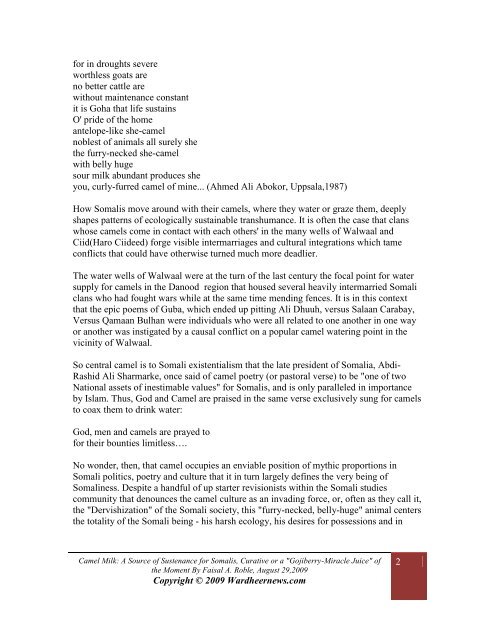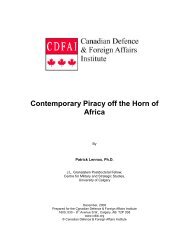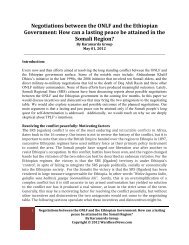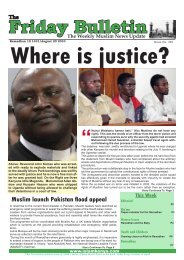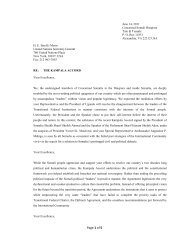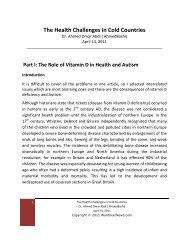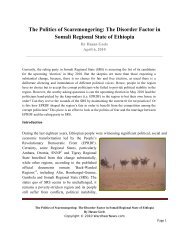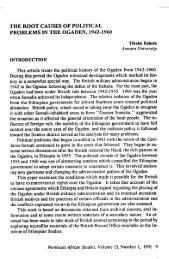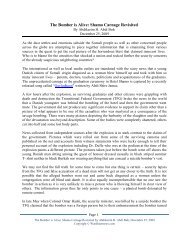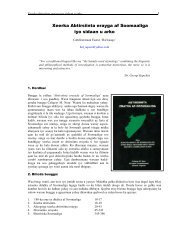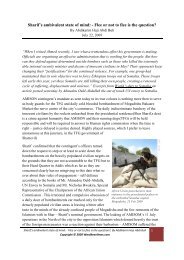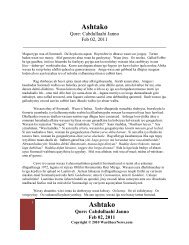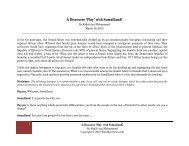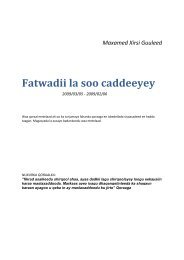The Two Filthy Ponds: Beel & Extreme Religion - WardheerNews
The Two Filthy Ponds: Beel & Extreme Religion - WardheerNews
The Two Filthy Ponds: Beel & Extreme Religion - WardheerNews
Create successful ePaper yourself
Turn your PDF publications into a flip-book with our unique Google optimized e-Paper software.
for in droughts severe<br />
worthless goats are<br />
no better cattle are<br />
without maintenance constant<br />
it is Goha that life sustains<br />
O' pride of the home<br />
antelope-like she-camel<br />
noblest of animals all surely she<br />
the furry-necked she-camel<br />
with belly huge<br />
sour milk abundant produces she<br />
you, curly-furred camel of mine... (Ahmed Ali Abokor, Uppsala,1987)<br />
How Somalis move around with their camels, where they water or graze them, deeply<br />
shapes patterns of ecologically sustainable transhumance. It is often the case that clans<br />
whose camels come in contact with each others' in the many wells of Walwaal and<br />
Ciid(Haro Ciideed) forge visible intermarriages and cultural integrations which tame<br />
conflicts that could have otherwise turned much more deadlier.<br />
<strong>The</strong> water wells of Walwaal were at the turn of the last century the focal point for water<br />
supply for camels in the Danood region that housed several heavily intermarried Somali<br />
clans who had fought wars while at the same time mending fences. It is in this context<br />
that the epic poems of Guba, which ended up pitting Ali Dhuuh, versus Salaan Carabay,<br />
Versus Qamaan Bulhan were individuals who were all related to one another in one way<br />
or another was instigated by a causal conflict on a popular camel watering point in the<br />
vicinity of Walwaal.<br />
So central camel is to Somali existentialism that the late president of Somalia, Abdi-<br />
Rashid Ali Sharmarke, once said of camel poetry (or pastoral verse) to be "one of two<br />
National assets of inestimable values" for Somalis, and is only paralleled in importance<br />
by Islam. Thus, God and Camel are praised in the same verse exclusively sung for camels<br />
to coax them to drink water:<br />
God, men and camels are prayed to<br />
for their bounties limitless….<br />
No wonder, then, that camel occupies an enviable position of mythic proportions in<br />
Somali politics, poetry and culture that it in turn largely defines the very being of<br />
Somaliness. Despite a handful of up starter revisionists within the Somali studies<br />
community that denounces the camel culture as an invading force, or, often as they call it,<br />
the "Dervishization" of the Somali society, this "furry-necked, belly-huge" animal centers<br />
the totality of the Somali being - his harsh ecology, his desires for possessions and in<br />
Camel Milk: A Source of Sustenance for Somalis, Curative or a "Gojiberry-Miracle Juice" of<br />
the Moment By Faisal A. Roble, August 29,2009<br />
Copyright © 2009 Wardheernews.com<br />
2


